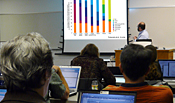You are here
Dr. Joseph Needoba to discuss Modern Approaches to Investigate Marine Biogeochemistry
Seminar summary: Studies of nutrient cycles in the ocean must be approached from a variety of scientific disciplines and over a wide range of spatial and temporal scales. The marine nitrogen cycle, in particular, consists of numerous biogeochemical transformations and pathways through the environment that can be difficult to quantify, or even observe. Yet gaining broad and detailed knowledge of nutrient cycling is fundamental for resource management and for gauging anthropogenic impacts on coastal ecosystems. From a stewardship perspective, one of the biggest challenges facing scientists is to better characterize the environmental variability that affects biological and chemical components of marine nutrient cycles. This seminar will describe some of the best methods available to quantify nitrogen transformations and fluxes in the ocean, and describe the LOBO (Land/Ocean Biogeochemical Observatory) research project in Elkhorn Slough, California. The project demonstrates the important research advantages of operating long-term aquatic observatories for investigating nutrient cycling and ecosystem functions. In situ sensors designed to operate continuously and report data in near real-time have been deployed and maintained on the mooring network since 2004. The results show how the ability to resolve the daily variability in nutrients, oxygen, and physical properties provides unprecedented understanding of biogeochemical cycling and ecosystem productivity of the estuary. The seminar will also include the primary applications of the LOBO project pertaining to the scientific advancement of estuarine research, ecosystem-based management, and public education.






